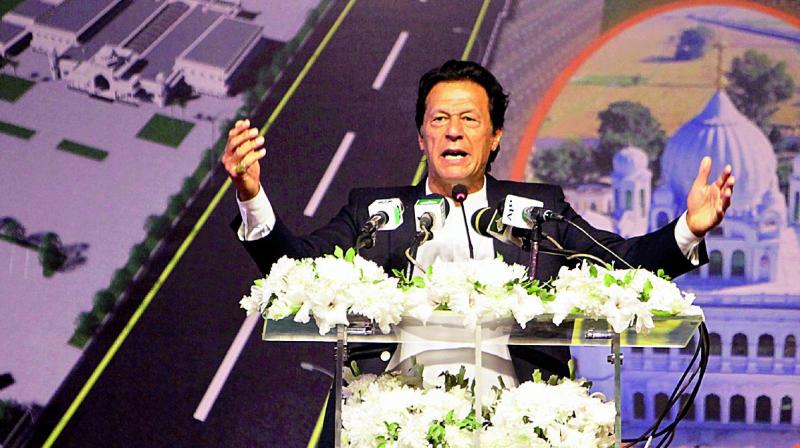Afghan crisis: Can Pak help the US find a solution?
More than ever, the US appears serious in finding a political solution to the Afghan crisis.

Just weeks after a toxic Twitter exchange between President Donald Trump and Prime Minister Imran Khan, the former has reportedly sought Islamabad’s help in the Afghan peace negotiations. While the full text of his letter to PM Khan is not known, Trump’s tenor seems to be mellower. One must not be surprised by this blow-hot-blow-cold game that has become the hallmark of the current state of Pakistan-US relations.
Ironically, while the Afghan war may be the basic cause of the tension between Pakistan and America, it has also been a reason for the two estranged allies to stay together. More than ever, the US appears serious in finding a political solution to the Afghan crisis. Trump’s message has come at a time when Zalmay Khalilzad, the special US envoy, has arrived in the region for his third round of shuttle diplomacy.
Although Khalilzad’s optimism about reaching a peace deal before the presidential elections in Afghanistan is a bit far-fetched, there are some strong indications of a thaw in negotiations with the Afghan Taliban. Being Afghan by origin has certainly given him more confidence. But there is a long way to go before one can hope to see the end to the longest war the United States has ever engaged in.
Notwithstanding all diplomatic efforts, the war has intensified, taking a huge toll on both sides. Khalilzad is engaging with the insurgents who appear much stronger with their successes on the battlefield. The increasing diplomatic legitimacy has certainly boosted their confidence. Declared as a terrorist group in the past, the Taliban are now recognised as an important military and political force in Afghanistan.
There is no indication yet of the Taliban accepting a ceasefire as being demanded by Washington. Khalilzad has held two preliminary meetings with Taliban representatives in Doha in October and November. The talks were mainly focused on what the Taliban described as part of a “trust-building process”. There has not been any statement from the US side about the outcome of the two meetings.
The Taliban reiterated their demand of official recognition for their office, scrapping the UN black list and release of Taliban prisoners as confidence-building measures. The Doha political office is critical for the insurgents to maintain contact with other countries. The Taliban had made it very clear that formal negotiations could not be started without the US willing to discuss the withdrawal of its military forces from Afghanistan.
One major challenge that Khalilzad faces is to get the Kabul government on board the reconciliation process. While giving tacit support to direct US talks with the insurgents, President Ashraf Ghani has expressed some reservations over his government being kept away from the negotiating table. The Afghan President does not share Khalilzad’s optimism that a peace deal is around the corner.
Addressing a conference on Afghanistan in Geneva last month, Ghani stressed the need for an Afghan-owned, Afghan-led peace process as the only viable path to ending the long conflict.
Ghani insists that any peace negotiations must include respect for Afghanistan’s Constitution and its provisions with regard to women, and an end to foreign interference in his country’s affairs. He announced the formation of a 12-member team to negotiate with the Afghan Taliban.
The Geneva conference, in which 61 countries and several international organisations participated, has placed a renewed focus on the imperatives of a negotiated peace in Afghanistan. The participants also agreed that the peace process cannot move forward successfully unless the Taliban entered into talks with the Afghan government. But there is no indication of the Taliban moving away from their hard-line position that rejects negotiations with the Kabul government. The insurgents have also rebuffed Ghani’s latest peace talks offer.
Notwithstanding the Taliban’s position, there have been some unofficial contacts established between the two sides at international conferences. One such informal interaction took place last month in Moscow, but both downplayed the importance of sharing a platform. The invitation for participation in the Moscow meeting was seen as a big diplomatic triumph for the Afghan Taliban. The insurgent group said in a statement that participation in the Moscow meeting was not about holding negotiations with “any side”.
The Moscow meeting that was attended by representatives of 11 regional countries called for the withdrawal of foreign troops from Afghanistan and a political solution to the problem. “It will now be difficult for anyone to defend the invasion of Afghanistan under the excuse of terrorism,” a Taliban spokesman said.
Surely, Pakistan’s role in Afghan reconciliation is extremely important, but it seems that it is difficult for Islamabad to come up to Washington’s expectations of making the talks work. It will certainly be in Pakistan’s own interest to help facilitate a negotiated political settlement. But there is a big question mark over its capacity to deliver on its promises.
By arrangement with Dawn

